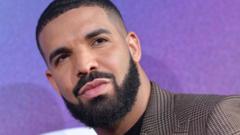Drake has pulled the plug on his legal proceedings against Universal Music and Spotify, where he claimed the two companies manipulated streaming numbers to favor Kendrick Lamar's diss track “Not Like Us.” Initially filed in November, Drake alleged that unnatural methods, including bots and payola, were employed to inflate the song’s online presence, which accuses him of inappropriate behavior. The allegations suggested that the swift rise in popularity of Lamar's track in sales and radio airplay stemmed from dubious practices within the music industry.
On a recent Tuesday, attorneys representing Drake voluntarily filed to retract their pre-action filing, signaling a conclusion to the case. Further details emerged that Drake convened with Spotify and Universal representatives that same day, leading to a consensus with Spotify against continuing the legal battle. While Universal opted not to contest, they maintained their stance on the case. However, Drake’s separate legal action against Universal and iHeartRadio in Texas remains unresolved.
The contentious backdrop involves a long-running rivalry between the two artists, which has been building since the early 2010s. In “Not Like Us," Lamar notably insinuates that Drake has inappropriate proclivities, thus igniting an intense response. Although Drake’s rebuttal came quickly with his track titled "The Heart Part 6," it did not achieve the same sonic saturation as Lamar's hit, which debuted atop the US charts and amassed over 1 billion streams on Spotify.
Drake's court documents accused Universal of strategically licensing Lamar's track at minimal rates to Spotify while falsely inflating its streaming metrics through automated means. His pre-action petition was an attempt to obtain internal Spotify and Universal documents, which he believed could support his claims.
In response, Universal categorically rejected the claims, asserting that their promotional practices align with the highest ethical standards in the industry. Similarly, Spotify argued that there was no financial incentive for its users to prefer Lamar’s track over Drake's.
Critics within the industry had doubted the possibility of the controversy leading to trial, with some suggesting that Drake aimed to extract information beneficial for future legal maneuvers. Entertainment lawyer Kevin Casini warned that making the allegations public could inadvertently bolster the song’s popularity further. The story unfolds against a backdrop of the streaming wars, illustrating the complex dynamics of fame, reputation, and industry practices in modern music.



















